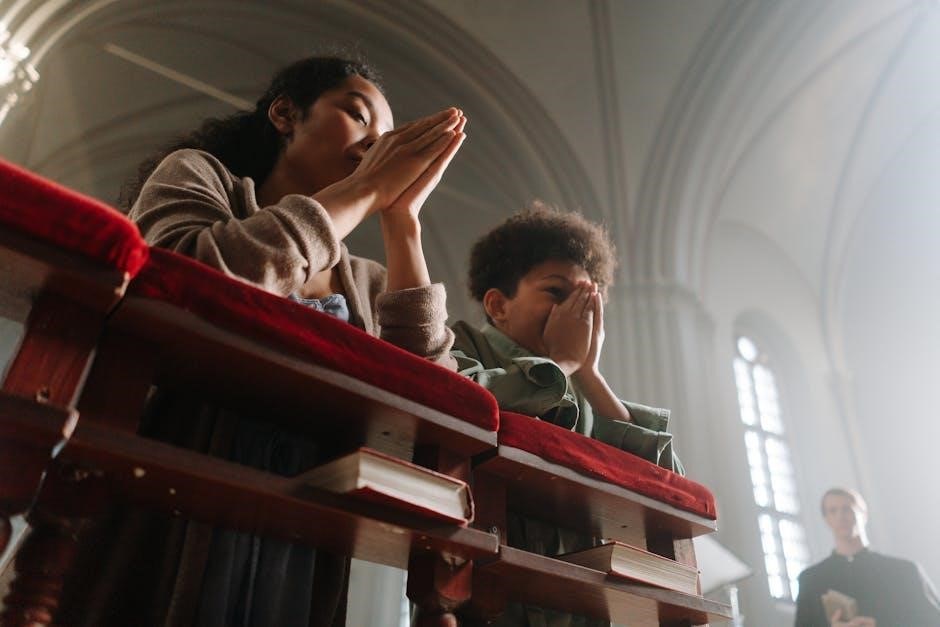faith and family coalition voter guide
The Faith and Family Coalition Voter Guide empowers voters to make informed decisions aligning with their faith and family values. It provides clear, nonpartisan information on candidates and issues, focusing on life, marriage, education, and religious freedom. Distributed through churches and community networks, it equips believers to pray, think, and vote responsibly, ensuring their voices shape a brighter future for generations to come.
Understanding the Purpose of the Guide
The Faith and Family Coalition Voter Guide serves as a vital resource for believers seeking to align their votes with biblical values. Its purpose is to educate voters on critical issues like life, marriage, and religious freedom, while providing nonpartisan comparisons of candidates. By empowering individuals with clear, concise information, the guide aims to inspire informed decision-making and active participation in shaping a society that reflects faith-based principles and fosters a culture of life and family.
Target Audience and Key Objectives
The Faith and Family Coalition Voter Guide targets Christian voters, families, and congregations, aiming to equip them with tools to engage effectively in elections. Its primary objective is to motivate believers to vote consistently with their faith, ensuring their voices influence policies on life, education, and freedom. By distributing guides through churches and online platforms, the coalition seeks to increase voter turnout and advocate for candidates who uphold biblical values, fostering a morally grounded society.
The Role of Faith in Shaping Voter Decisions
Faith serves as a moral compass, guiding voters to align decisions with biblical values and principles, ensuring their choices reflect their deeply held beliefs and convictions.
How Religious Beliefs Influence Political Choices
Religious beliefs profoundly influence political choices by shaping voters’ moral frameworks and priorities; Many voters prioritize candidates who align with their faith’s teachings on life, family, and freedom. Biblical principles guide decisions on issues like abortion, education, and social justice. Churches and faith leaders play a crucial role in educating congregations, enabling them to make informed, values-driven choices at the polls. This connection between faith and policy fosters a sense of accountability and purpose among voters.
Historical Context of Faith-Based Voting Coalitions
Faith-based voting coalitions have deep roots in American history, emerging as a response to moral and social issues. The Civil Rights Movement and the rise of the Moral Majority in the 1980s laid the groundwork for these coalitions. Religious groups united to advocate for policies reflecting biblical values, influencing elections and shaping political landscapes. This historical legacy continues to inspire modern coalitions, emphasizing the power of faith in driving civic engagement and policy change.

Key Issues Addressed in the Voter Guide
The guide focuses on pro-life policies, family values, education reform, and religious freedom, ensuring voters align with candidates who uphold these principles and biblical standards.
Pro-Life and Family-Centric Policies
The Faith and Family Coalition Voter Guide emphasizes the sanctity of life, advocating for policies that protect the unborn and support families. It endorses candidates who promote parental rights, traditional marriage, and ethical healthcare. By prioritizing these values, the guide helps voters align their choices with biblical principles, fostering a culture that cherishes life and strengthens family bonds for future generations.
Education and Religious Freedom
The Faith and Family Coalition Voter Guide champions education that honors parental rights and religious liberty. It supports school choice, biblical values in curriculum, and freedom from government overreach. By advocating for these principles, the guide ensures families can raise their children in accordance with their faith, fostering a society where religious freedom and educational excellence thrive for generations to come.

How the Faith and Family Coalition Impacts Elections
The Faith and Family Coalition unites voters with shared values, influencing election outcomes through grassroots efforts and a proven track record of effective, faith-driven political engagement.
Grassroots Mobilization Strategies
The Faith and Family Coalition employs grassroots strategies to engage communities, including local events, door-to-door outreach, and digital tools. Church networks and local leaders amplify the message, ensuring voters are informed and motivated. By equipping individuals with resources and training, the coalition fosters a culture of advocacy, empowering citizens to champion their values at the polls. This ground-level approach ensures a strong, unified voice in shaping election outcomes and policy decisions.
Success Stories from Past Elections
The Faith and Family Coalition has made significant impacts in past elections by mobilizing faith-based communities. In state elections, their voter guides influenced key races, ensuring pro-family candidates prevailed. By empowering churches to distribute resources, they increased voter turnout in critical districts. Their efforts successfully advocated for policies supporting life, education, and religious freedom, demonstrating the power of unified grassroots action in shaping election outcomes and advancing values-driven governance at all levels.
Engaging Congregations and Communities
The Faith and Family Coalition empowers congregations to mobilize voters through educational resources and grassroots efforts, fostering unity and advocacy for values-driven policies in communities nationwide.
Resources for Churches and Faith Leaders
The Faith and Family Coalition provides churches with voter guides, educational materials, and tools to empower congregations. These resources include candidate comparisons, issue-based summaries, and sermon guides to help faith leaders address key topics. Churches can access free, nonpartisan voter guides to distribute to their members, fostering informed decision-making. Additionally, online platforms offer downloadable materials, enabling faith communities to engage effectively in the electoral process while staying true to their values and mission.
Building a Network of Advocates
The Faith and Family Coalition fosters a network of advocates by connecting individuals and groups who share values of faith, family, and freedom. Through grassroots initiatives, the coalition equips believers with tools to engage in civic processes, fostering a collective voice for moral and ethical governance. By training volunteers and leveraging digital platforms, the network amplifies its impact, ensuring that faith-based values influence public policy and elections, creating a lasting legacy for future generations.
Endorsements and Voter Comparisons
The Faith and Family Coalition provides endorsements and voter comparisons, evaluating candidates based on their alignment with faith and family values. This guide helps voters make informed decisions by highlighting candidates who support life, religious freedom, and traditional marriage, ensuring alignment with biblical principles and fostering a morally grounded political landscape.
How Candidates Are Evaluated
Candidates are evaluated based on their alignment with faith and family values, including pro-life policies, support for religious freedom, and traditional marriage. Their voting records, public statements, and endorsements are analyzed to determine consistency with biblical principles. The guide also considers candidates’ positions on education, family-centric issues, and moral leadership, providing voters with a clear comparison of where candidates stand on key matters of faith and conscience.
Comparative Analysis of Political Candidates
The guide provides a comparative analysis of candidates, highlighting their positions on key issues like life, family, and religious freedom. Voters can easily compare where candidates stand on these matters, ensuring alignment with their faith values. The analysis also considers endorsements and voting records, offering a clear, side-by-side evaluation to help voters make informed decisions that reflect their biblical beliefs and priorities.

Challenges and Opportunities in Modern Elections
Modern elections bring challenges like polarization and misinformation but also opportunities for faith-based coalitions to amplify their voices through technology and grassroots engagement, inspiring values-driven voting.
Navigating Partisan Divides
Navigating partisan divides requires balancing faith values with political realities. The Faith and Family Coalition encourages unity across party lines, focusing on shared moral principles like life, family, and freedom. By emphasizing nonpartisan collaboration, the coalition helps voters transcend divisive rhetoric, promoting a platform that aligns with biblical teachings. This approach fosters dialogue and cooperation, ensuring faith-based values remain central in shaping public policy and electoral outcomes, regardless of political affiliation.
Technological Advancements in Voter Outreach
Technological advancements are revolutionizing voter outreach for the Faith and Family Coalition. Digital tools like social media campaigns, online voter guides, and virtual town halls enable widespread engagement. Interactive resources, such as candidate comparison tools and issue-based webinars, empower voters with ease. These innovations ensure that faith-based values reach a broader audience, particularly younger demographics, fostering informed participation and strengthening the coalition’s impact in modern elections.
Faith-based voting coalitions are poised for growth, uniting communities and amplifying values-driven advocacy. By embracing innovation and unity, these coalitions will continue shaping elections and fostering a brighter future.
Lessons Learned and Future Directions
The Faith and Family Coalition has demonstrated the power of uniting communities through shared values. Lessons learned highlight the importance of nonpartisan voter guides and grassroots engagement. Moving forward, leveraging technology for wider outreach and fostering intergenerational advocacy will be critical. By equipping believers with resources and inspiration, the coalition can continue to mobilize voters, ensuring faith and family values remain central in shaping the nation’s future. Collective impact demands sustained effort and innovation.
Call to Action for Voters and Advocates
Voters are urged to pray, think, and vote with discernment, aligning their choices with faith and family values. Advocates are encouraged to share voter guides, mobilize congregations, and engage in respectful conversations. By uniting in purpose, believers can collectively impact elections and foster a culture that honors life, liberty, and family. Let us act with urgency and hope, shaping a future where faith and values guide public policy and societal progress.
